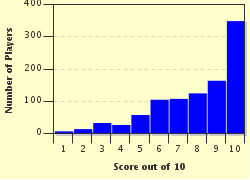Quiz Answer Key and Fun Facts
1. This quiz examines the use of zeugma and its wicked stepsister syllepsis in literature, and how classic authors have made use of the device in comical ways. First off, though, what exactly is a zeugma? (Hint: There's one in the quiz title, "Turning Neither Left Nor White")
2. In one of his more serious dramas, William Shakespeare used comic relief in the form of zeugma to lighten the mood. In that play, Fluellen, a Welsh captain, makes the following statement:
"Kill the boys and the luggage!"
It's pretty clear that's not what he meant. In which drama does that miscommunication contrast with serious scenes like the death of Falstaff, the Battle of Agincourt, and the title character's St. Crispin's Day Speech?
3. "The Devil's Dictionary" was published by a disillusioned American satirist in 1911, probably with the intention of a few laughs. The dictionary sarcastically defined words with rhetorical gusto, including a few notable examples of syllepsis:
"Piano, n. A parlor utensil for subduing the impenitent visitor. It is operated by depressing the keys of the machine and the spirits of the audience."
Which "bitter" American author of a short story about Peyton Farquhar was responsible for "The Devil's Dictionary"?
4. "Oh, flowers are as common here, Ms. Fairfax, as people are in London."
In that quote, Cecily Cardew is using a double meaning for the word "common," as the second clause refers to Londoners as poor and simple. She is talking to Gwendolyn Fairfax, a woman who plans to marry Jack Worthing principally because he has adopted a new moniker; unfortunately, Cecily is planning to marry Algernon Montcrieff, who has adopted the same name. In what Oscar Wilde play does name confusion lead to some hilarious trivialities?
5. The poem "London," intended to be a parody of Juvenal's "Satires" includes an alliterative use of syllepsis in the second stanza:
"Here Malice, Rapine, Accident conspire
And now a Rabble Rages, now a Fire"
That poem was the first major published work of an English poet, novelist, and critic famous for the book "Rasselas," a dictionary of the English language, and being followed around by James Boswell for a long while. Who was that author?
6. Sometimes, the use of syllepsis makes a sentence seem almost melodramatic, as seen in the example below:
"He carried a strobe light and the responsibility for the lives of his men."
Which Vietnam War-set collection of short stories written by Tim O'Brien gives that resonating description of Lt. Jimmy Cross?
7. All right, here's one to cheer you up:
"Here, Thou, great Anna! whom three Realms obey,
Dost sometimes Counsel take- and sometimes tea"
The syllepsis present here contrasts the meaning of the word "take," but that makes up very little of the mock-epic poem, which explores the danger inherent in stealing a small piece of hair. From what work, written by Alexander Pope, is the quote above taken?
8. Here's what happens in chapter 1 of a very famous American novel, in a nutshell: A boy's aunt interrogates him about skipping school, and he successfully evades her questioning. He goes outside, meeting a well-dressed, larger boy with whom he immediately picks a fight. Then:
"In an instant both boys were rolling and tumbling in the dirt, gripping together like cats; and for the space of a minute they tore and tugged at each other's hair and clothes, punched and scratched each other's noses, and covered themselves with dust and glory."
Personally, I find the contrast between dust and glory amusing, but the boy's aunt doesn't; instead, he gets forced into whitewashing a fence on Saturday as punishment. Given all that, what boy from classic literature ends up picking that fight and earning Aunt Polly's irritation?
9. One would expect an author of "The Elements of Style" to use exceptional grammar and never be caught using ambiguous constructions like syllepses. Not so! Here are two examples:
"She tracks sand in as well as ideas, and I have to sweep up after her two or three times a day."
"When I address Fred I never have to raise either my voice or my hopes."
Those quotes appeared in one author's works for adults, like "On a Florida Key," but he's better known for writing children's books. What creator of the zeugmas above also was responsible for "The Trumpet of the Swan" and "Stuart Little?"
10. When it comes to the comical use of zeugma, though, one author clearly reigns supreme. Consider the following examples:
"She looked at the objects with suspicion and a magnifying glass." ("The Pickwick Papers")
"He was alternately cudgelling his brains and his donkey when, passing the workhouse, his eyes encountered the bill on the gate." ("Oliver Twist")
"Mr. Pickwick took his hat and his leave." ("The Pickwick Papers")
"He [Mr. Finching] proposed seven times once in a hackney-coach once in a boat once in a pew once on a donkey at Tunbridge Wells and the rest on his knees." ("Little Dorrit")
"Miss Bolo went home in a flood of tears and a sedan chair." ("The Pickwick Papers")
There are dozens of examples of syllepsis from which British wit, author of the novels listed above?
Source: Author
adams627
This quiz was reviewed by FunTrivia editor
looney_tunes before going online.
Any errors found in FunTrivia content are routinely corrected through our feedback system.

